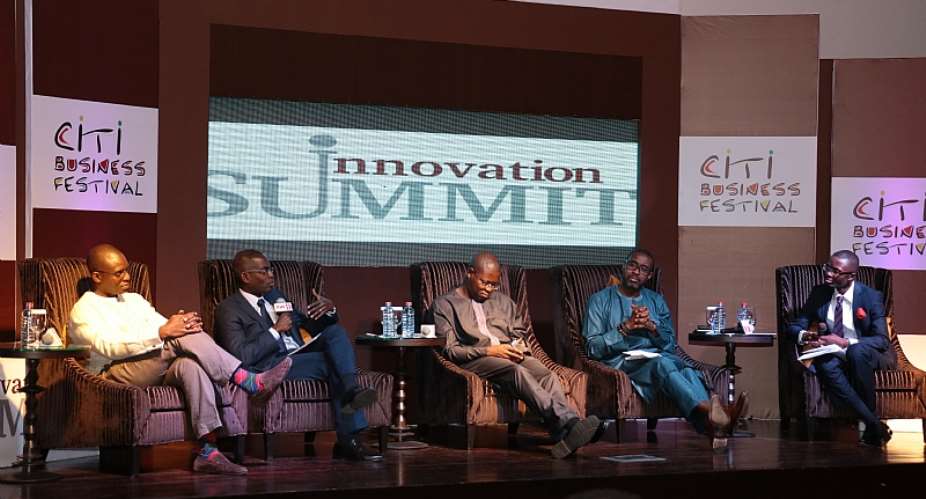Some key business leaders in the country have concluded that technology will drive the business environment in the next twenty years.
According to them, the fast pace of the internet of things will compel businesses to be innovative in order to meet the dynamic needs of society.
Legal Practitioner , Ace Kojo Anan Ankomah; Patrick Awuah, founder of Ashesi University; CEO of Rancard, Kofi Dadzie, as well as CEO of mpedigree and Honorary Director at IMANI Ghana, Bright Simons all justified the relevance of technology in the future of Ghana's business.
They were speaking at the maiden edition of Citi FM's Innovation Summit as part of the Citi Business Festival.
Opening the discussion, the CEO of Rancard Solutions, Kofi Dadzie indicated that skills ought to be developed as Africa will have a windfall of a large skill set needed to solve societal needs.
“The hard trends are based on the identifiable things in the future. The soft trends are the things that have to be developed to actually make them happen. One example of hard trends is that connectedness is increasing both among people and devices,” he said.
He pointed out that, the infrastructure, population growth and the skills needed are some of the means to address the hard trends.
For his part, the Founder and President of Ashesi University, Patrick Awuah noted that there is a need for innovation to address challenges associated with rapid population growth.
“It is really hard to know what Ghana will look like in the next twenty years …The population of Ghana will be approximately 40 million by 2035. Africa's population will be about 1.7 billion,” he said.
He warned that climate change will have ramifications for everyone on the planet and certainly for Africa.
Mr. Awuah added, “Technology is changing rapidly and what is happening to tech today is that we are going beyond the age of information and entering the age of machines”.
Also, the CEO of mpedigree and Honorary Director at IMANI Ghana, Bright Simons asserted of a likely deformalization of the economy.
Startling figures to back his argument were that; the number of graduates will increase to about 100,000 per year.
He explained that the challenge lies in Ghana's weak human resource management systems to absorb the teeming numbers.
“Expect next year a graduate population of about 100,000. Masters' and doctoral enrolment are increasing by a combined 70 percent per annum over the last five years. More females are enrolling in post graduate programs in the sciences than male students,” he observed.
Making a prediction on Ghana's graduates, Mr. Simons stated that in five to ten years, everyone will have a degree.
“One challenge that I perceive is that increasingly people will rely on providing goods and services than providing services in house,” he added.
Meanwhile, Mr. Ankomah maintained that it is important to move away from traditional ways of providing legal services since it increases cost unnecessarily.
“Cost has become a critical change factor. As legal expenses have become high, clients are beginning to drive and move towards technology. Technology has become a key and central part of the legal profession,” he noted.
Challenges to innovation in Ghana
Speaking on some challenges to innovation in Ghana, Mr. Simons blamed Ghana's leadership culture for the under utilization of technology in the country.
According to him, it is imperative for leaders to embrace innovative ways of solving challenges to encourage others.
On his part, Mr. Ankomah also expressed grave concern at the apparent limited use of technology despite access to sophisticated devices.
“Those who want to move forward will move very quickly. It is a mental thing that starts with the mind”.
Solution
Determining some solutions to the challenges, Mr. Awuah advocated a more activist approach from corporate Ghana.
Calling for collaborations among business, Mr. Simons also pointed out that the single most important drive to tech success is for businesses to network.
–
By: Pius Amihere Eduku/Lawrence Segbefia/citibusinessnews.com/Ghana





 Dumsor: Don't rush to demand timetable; the problem may be temporary — Atik Moha...
Dumsor: Don't rush to demand timetable; the problem may be temporary — Atik Moha...
 Space X Starlink’s satellite broadband approved in Ghana — NCA
Space X Starlink’s satellite broadband approved in Ghana — NCA
 2024 election will be decided on the grounds of the economy; choice of running m...
2024 election will be decided on the grounds of the economy; choice of running m...
 Dumsor: We're demanding less; just give us a timetable — Kwesi Pratt to ECG
Dumsor: We're demanding less; just give us a timetable — Kwesi Pratt to ECG
 Do I have to apologise for doing my security work, I won’t – Simon Osei-Mensah r...
Do I have to apologise for doing my security work, I won’t – Simon Osei-Mensah r...
 All my businesses have collapsed under Akufo-Addo — NDC Central regional chair
All my businesses have collapsed under Akufo-Addo — NDC Central regional chair
 Military, Prison Officers clash in Bawku, three injured
Military, Prison Officers clash in Bawku, three injured
 GRA-SML contract: MFWA files RTI request demanding KPMG report
GRA-SML contract: MFWA files RTI request demanding KPMG report
 Court threatens to call second accused to testify if NDC's Ofosu Ampofo fails to...
Court threatens to call second accused to testify if NDC's Ofosu Ampofo fails to...
 Family accuses hospital of medical negligence, extortion in death of 17-year-old...
Family accuses hospital of medical negligence, extortion in death of 17-year-old...
